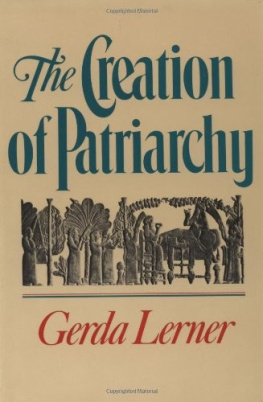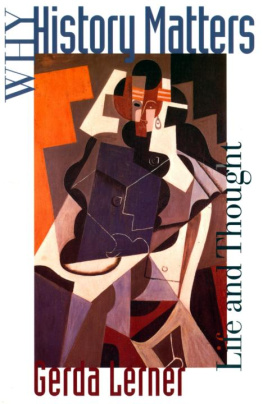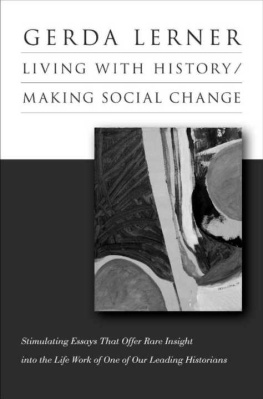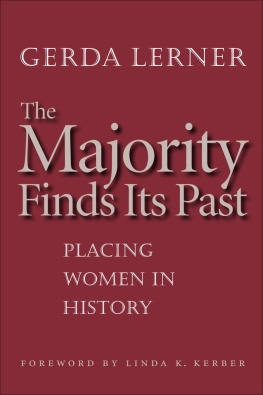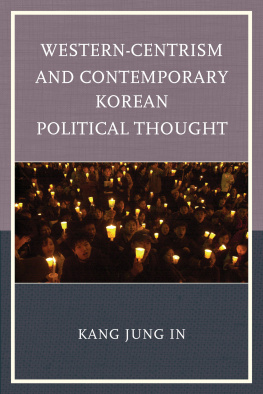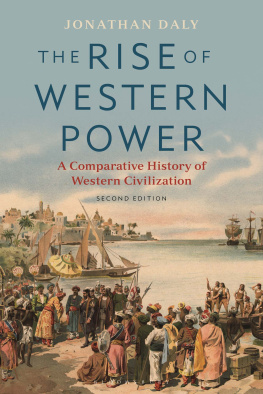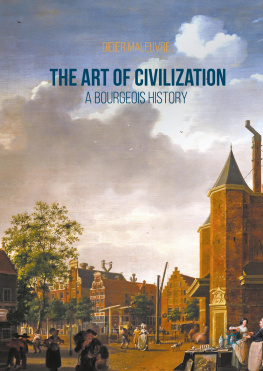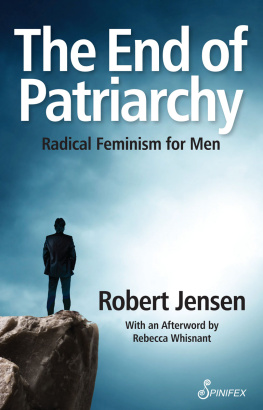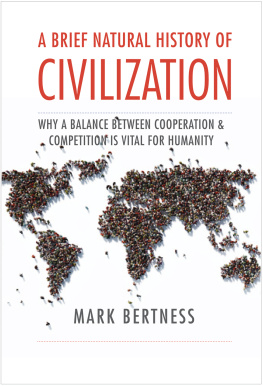Gerda Lerner - The Creation of Patriarchy
Here you can read online Gerda Lerner - The Creation of Patriarchy full text of the book (entire story) in english for free. Download pdf and epub, get meaning, cover and reviews about this ebook. year: 1986, publisher: Oxford University Press, USA, genre: Science. Description of the work, (preface) as well as reviews are available. Best literature library LitArk.com created for fans of good reading and offers a wide selection of genres:
Romance novel
Science fiction
Adventure
Detective
Science
History
Home and family
Prose
Art
Politics
Computer
Non-fiction
Religion
Business
Children
Humor
Choose a favorite category and find really read worthwhile books. Enjoy immersion in the world of imagination, feel the emotions of the characters or learn something new for yourself, make an fascinating discovery.
- Book:The Creation of Patriarchy
- Author:
- Publisher:Oxford University Press, USA
- Genre:
- Year:1986
- Rating:4 / 5
- Favourites:Add to favourites
- Your mark:
- 80
- 1
- 2
- 3
- 4
- 5
The Creation of Patriarchy: summary, description and annotation
We offer to read an annotation, description, summary or preface (depends on what the author of the book "The Creation of Patriarchy" wrote himself). If you haven't found the necessary information about the book — write in the comments, we will try to find it.
The Creation of Patriarchy — read online for free the complete book (whole text) full work
Below is the text of the book, divided by pages. System saving the place of the last page read, allows you to conveniently read the book "The Creation of Patriarchy" online for free, without having to search again every time where you left off. Put a bookmark, and you can go to the page where you finished reading at any time.
Font size:
Interval:
Bookmark:
THE CREATION OF PATRIARCHY
WOMEN AND HISTORY
Volume One:The Creation of Patriarchy

OXFORD UNIVERSITY PRESS
New YorkOxford
Oxford University Press
OxfordNew YorkToronto
DelhiBombayCalcuttaMadrasKarachi
Petaling JayaSingaporeHong KongTokyo
NairobiDar es SalaamCape Town
MelbourneAuckland
and associated companies in
BeirutBerlinIbadanNicosia
Copyright 1986 by Gerda Lerner
First published in 1986 by Oxford University Press, Inc.,
198 Madison Avenue, New York, New York 10016-4314
First issued as an Oxford University Press paperback, 1987
Oxford is a registered trademark of Oxford University Press
All rights reserved. No part of this publication may be reproduced, stored in a retrieval system, or transmitted, in any form or by any means, electronic, mechanical, photocopying, recording, or otherwise, without the prior permission of Oxford University Press, Inc.
Library of Congress Cataloging-in-Publication Data
Lerner, Gerda, 1920
Women and history.
Bibliography: v. 1, p.Induces index.
Contents: v. 1. The creation of patriarchy
1.WomenHistory.1.Title.
HQ1121.L471986305.40985-21578
ISBN 0-19-503996-3 (v. 1)
ISBN 0-19-505185-8 (pbk.)
Printed in the United States of America
printing, last digit:201918171615
For
Virginia Warner Brodine and Elizabeth Kamarck Minnich
whose thought has challenged and confirmed mine
and whose friendship and love
have strengthened and supported me

This book has been eight years in the making. It began in 1977 with a few questions which had occupied my attention, off and on, for over fifteen years. They led me to the hypothesis that it is the relationship of women to history which explains the nature of female subordination, the causes for womens cooperation in the process of their subordination, the conditions for their opposition to it, the rise of feminist consciousness. I had then in mind the formulation of a general theory on women in history, and it took nearly five years of work to show me that such a goal was premature. The sources in Ancient Near Eastern culture were so rich, and yielded so many insights, that I realized I would need an entire volume to explore this material. Thus the project expanded into two volumes.
I presented the theoretical outline of my projected work in a workshop at the conference The Second SexThirty Years Later: A Commemorative Conference on Feminist Theory at New York University, Sept. 2729, 1979. In this workshop I had the benefit of the stimulating comments made by the writer Elizabeth Janeway and the philosopher Elizabeth Minnich. A revised version of this paper was presented at the 1980 meeting of the Organization of American Historians, San Francisco, April 912, 1980. The session was presided over by Mary Benson. The helpful critical comments by Sara Evans and George M. Frederickson furthered my understanding.
In the initial stages of my research, I was greatly aided by a Guggenheim Foundation grant in 1980-81, which gave me a year in which to read in anthropology and feminist theory and to study the problem of the origin of slavery. One result of that years work was the chapter The Slave Woman, which I presented at the Berkshire Conference of Women Historians at Vassar College in June 1981. I greatly benefitted from the insightful critique of Elise Boulding and Linda Kerber and from the comments of Robin Morgan, who examined the material from the vantage point of a feminist theoretician. My paper, in a revised form was published as Women and Slavery in Slavery and Abolition: A Journal of Comparative Studies, Vol. 4, no. 3 (December 1983), pp. 173198.
A chapter of this book was published as The Origin of Prostitution in Ancient Mesopotamia in SIGNS: Journal of Women in Culture, Vol. XI, no. 2 (Winter 1985).
The Graduate School of the University of Wisconsin-Madison has supported my research on this book with a summer research grant in 1981 and with grants for project assistants. My appointment as Wisconsin Alumni Research Foundation Senior Distinguished Research Professor in 1984 gave me a semester free from teaching obligations, which enabled me to do final revisions and complete the book. I am deeply grateful not only for the tangible support, but for the encouragement of my work implicit in it. The Womens Studies department of the University of Wisconsin-Madison twice offered me an opportunity to share my work in progress with faculty and students, whose keen and lively criticism was of considerable help to me. I am also greatly appreciative of the hospitality offered to me as a visiting scholar by the department of History, University of California at Berkeley in the Spring term 1985.
My work on this book presented me with unusual challenges. To step outside ones own discipline and training is in itself a difficult undertaking. To do so asking large questions and attempting to remain critical of the answers provided in the major conceptual frameworks of the thought of Western civilization is daunting, at the least. I represented in my own person all the internalized obstacles that have stood in the way of womens thinking on a grand scale, as men have done. I could not have persisted in the effort without the encouragement provided by the community of feminist thinkers in general and the very specific and personal encouragement provided for me by friends and colleagues within that community. Virginia Brodine, Elizabeth Minnich, Eve Merriam, Alice Kessler-Harris, Amy Swerdlow, the late Joan Kelly, Linda Gordon, Florenda Mallon, Steve Stern, and Stephen Feierman gave me friendship and support and were endlessly patient listeners and critics. In addition to their help along the way Brodine, Minnich, Gordon, and Kessler-Harris read a late draft of the manuscript. Their sympathetic response and detailed criticism sent me off on a final revision which dramatically changed the book. They confirmed and sharpened my thought and helped me to stay with the process until I found the form which expresses my meaning. That is constructive criticism at its best and I am thankful for it. I hope they will like the outcome.
Other colleagues at the University of Wisconsin-Madison, whose criticism of one or several chapters enriched my understanding are: Judy Leavitt (History of Medicine), Jane Shoulenburg (Womens History), Susan Friedman and Nellie McKay (Literature), Virginia Sapiro (Political Science), Anne Stoller (Anthropology), and Michael Clover (History and Classics). Colleagues from other institutionsAnn Lane (Womens History, Colgate University), Rayna Rapp (Anthropology, The New School for Social Research), Joyce Riegelhaupt (Anthropology, Sarah Lawrence College), Jonathan Goldstein (Classics, University of Iowa), and Evelyn Keller (Mathematics and Humanities, Northeastern University)provided criticism from the vantage point of their particular disciplines and were helpful with bibliographical suggestions.
Very special thanks are due to those specialists in Assyriology, who, despite my being an outsider to their field, offered me advice, criticism, and many helpful leads. I am grateful for their generosity, interest, and collegiality. The help they provided does not necessarily imply their support of my conclusions; although I have been guided by their suggestions, any errors of fact or interpretation are my responsibility. I would like to thank Jack Sasson (Religion, University of North Carolina, Chapel Hill), Jerrold Cooper (Near Eastern Studies, The Johns Hopkins University), Carole Justus (Linguistics, University of Texas at Austin), Denise Schmandt-Besserat (Middle Eastern Studies, University of Texas at Austin), and especially Anne Draffkorn Kilmer (Near Eastern Studies, University of California at Berkeley) for their reading of the entire manuscript, their criticism and the many suggestions for references and sources they offered me. Over and above this, Denise Schmandt-Besserat shared bibliographies in her specialty, made suggestions for further contacts among experts in Assyriology, and raised a number of searching questions that caused me to rethink some of my conclusions. Ann Kilmer did more than anyone else to orient me in her field, to help me with difficult passages and with translations, to direct me to references in recent specialized journals, and to open the library resources of her department to me. My gratitude for her generosity and kindness goes beyond words. The Assyriologist Rivkah Harris and Michael Fox (Hebrew Studies, University of Wisconsin-Madison), who read several chapters, disagreed with my thesis and some of my conclusions, but generously helped with criticism and references.
Next pageFont size:
Interval:
Bookmark:
Similar books «The Creation of Patriarchy»
Look at similar books to The Creation of Patriarchy. We have selected literature similar in name and meaning in the hope of providing readers with more options to find new, interesting, not yet read works.
Discussion, reviews of the book The Creation of Patriarchy and just readers' own opinions. Leave your comments, write what you think about the work, its meaning or the main characters. Specify what exactly you liked and what you didn't like, and why you think so.

